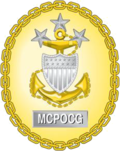| Master Chief Petty Officer of the Coast Guard | |
|---|---|
 Seal of the Coast Guard | |
 Badge of the MCPOCG | |
| United States Coast Guard | |
| Type | Senior enlisted advisor |
| Abbreviation | MCPOCG |
| Reports to | Commandant of the Coast Guard |
| Appointer | Commandant of the Coast Guard |
| Term length | 4 years |
| Formation | 27 August 1969 |
| First holder | Charles L. Calhoun |
| Deputy | Deputy Master Chief Petty Officer of the Coast Guard |
| Salary | $10,758.00 per month, regardless of the incumbent's service longevity [1] |
| Website | uscg.mil/MCPOCG |
The master chief petty officer of the Coast Guard (MCPOCG) is the senior enlisted member of the U.S. Coast Guard and the principal advisor to the commandant of the Coast Guard on all enlisted personnel matters.
Contents
The holder of this position is equivalent to the master chief petty officer of the Navy, sergeant major of the Marine Corps, sergeant major of the Army, chief master sergeant of the Air Force, and chief master sergeant of the Space Force, and by protocol, is equal to a vice admiral. [2]
The MCPOCG is appointed by the commandant of the Coast Guard to serve as a spokesperson to address the issues of enlisted personnel to the highest levels in the Coast Guard and is designated as a special paygrade above E-9. As such the MCPOCG is the senior enlisted advisor to the commandant of the Coast Guard. The MCPOCG's exact duties vary, depending on the commandant, though generally devotes much time traveling throughout the Coast Guard observing training and communicating with coast guardsmen and their families. The normal tour of assignment is four years, which typically runs concurrently with the commandant.
The first member to hold this post was MCPOCG Charles L. Calhoun. The 15th and current MCPOCG is Phillip N. Waldron who assumed office on 25 July 2025. [3] [4]


















